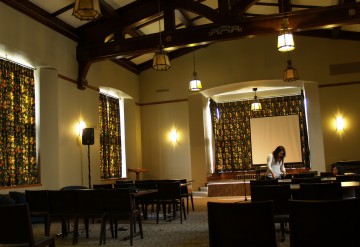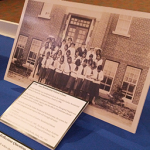UBC Dialogues: Okanagan – How Can We Protect Our Water?
The Okanagan is known for its pristine lakes and rivers. Tourists visit the region for the scenery, vineyards, and abundant recreation opportunities that these waters provide. Residents rely on this water every day. But how clean is it, really? Wastewater, as well as chemical runoff from industry and agriculture, poses a threat to our freshwater supplies. How can we neutralize these threats without sacrificing our economic well-being? What steps can we take to ensure our most valuable resource remains clean and abundant for years to come.
Moderator
Chris Walker – Host, CBC’s Daybreak South
Panelists
Bruce Mathieson – Associate Professor, Biology, UBC’s Okanagan campus
Ivor Norlin – Manager of Infrastructure Programs, Interior Health, Health Protection
Anna Warwick Sears – Executive Director, Okanagan Basin Water Board
Relevant Books and Articles at UBC Library
Mathieson, W. B. (1996). Development of arginine vasotocin innervation in two species of anuran amphibian: Rana catesbeiana and rana sylvatica. Histochemistry and Cell Biology, 105(4), 305. [Link]
Maler, L., Collins, M., & Mathieson, W. B. (1981). The distribution of acetylcholinesterase and choline acetyl transferase in the cerebellum and posterior lateral line lobe of weakly electric fish (gymnotidae). Brain Research, 226(1), 320-325. doi:10.1016/0006-8993(81)91106-9 [Link]
UBC Library Research Guides
UBC Dialogues: Victoria – Who Should BC Ferries Serve?
Fares are rising while service is being cut. Ridership is down on high-volume routes. BC has maintained a high level of ferry service, but many vessels need replacing and operating costs are rising. Business as usual is no longer enough so what should be done to steer this ship? One solution is to increase revenues by making the organization more tourist-focused: offering vacation packages, on-board gaming and other amenities. But is this enough? And where does it leave the coastal and island residents that depend on the ferries for regular, affordable transportation? Should the ferries be operated as a public service or a business? Or should other alternatives be investigated?
Panelist Biographies
Gregor Craigie
 Gregor Craigie is no stranger to Vancouver Island. He covered many stories on the island during his time as CBC TVs Victoria reporter. He studied history at the University of Calgary, and Broadcast Journalism at the B.C. Institute of Technology. His first radio job was reporting for CKWX in Vancouver. In 1999 he moved to the United Kingdom where he joined the BBC World Service in London as a news announcer and producer. While in London, Gregor also reported for the American network CBS radio, in addition to freelancing for CBC Radio. When it got really busy he would file for all three news organizations, occasionally working twenty hours a day. For rest and relaxation he traveled to Europe, Africa, and Asia to work as a freelancer. Following his BBC/CBC/CBS days, Gregor returned to Canada and to the CBC exclusively. Most recently he has worked as a producer on The Current and a radio reporter in the Kootenays. Gregor and his wife Rebecca and their son Lochlan are happy to be on the island and looking forward to staying in one place for a long time to come.
Gregor Craigie is no stranger to Vancouver Island. He covered many stories on the island during his time as CBC TVs Victoria reporter. He studied history at the University of Calgary, and Broadcast Journalism at the B.C. Institute of Technology. His first radio job was reporting for CKWX in Vancouver. In 1999 he moved to the United Kingdom where he joined the BBC World Service in London as a news announcer and producer. While in London, Gregor also reported for the American network CBS radio, in addition to freelancing for CBC Radio. When it got really busy he would file for all three news organizations, occasionally working twenty hours a day. For rest and relaxation he traveled to Europe, Africa, and Asia to work as a freelancer. Following his BBC/CBC/CBS days, Gregor returned to Canada and to the CBC exclusively. Most recently he has worked as a producer on The Current and a radio reporter in the Kootenays. Gregor and his wife Rebecca and their son Lochlan are happy to be on the island and looking forward to staying in one place for a long time to come.
Mike Corrigan
 Mike Corrigan is President and Chief Executive Officer of British Columbia Ferry Services Inc., one of the largest ferry transportation companies in the world. Mr. Corrigan has been a senior executive with BC Ferries since joining the company in 2003, serving in the separate roles of Chief Operating Officer (2006-2011) and Executive Vice President of Business Development (2003-2006). In addition to overseeing all aspects of BC Ferries’ operations as COO, Mr. Corrigan has been responsible for creating and leading the company’s SailSafe program that has established a comprehensive safety culture at BC Ferries. The successful, trendsetting program is a joint initiative with the BC Ferry and Marine Workers’ Union. Prior to joining BC Ferries, Mr. Corrigan worked in senior roles with Westcoast Energy in both British Columbia and Ontario. He has a MBA from the University of Victoria, a Bachelor of Business from the University of Western Michigan and an Arts Degree from Kalamazoo College in Michigan. Mike grew up in Sudbury, Ontario and now resides in Victoria with his wife and two daughters.
Mike Corrigan is President and Chief Executive Officer of British Columbia Ferry Services Inc., one of the largest ferry transportation companies in the world. Mr. Corrigan has been a senior executive with BC Ferries since joining the company in 2003, serving in the separate roles of Chief Operating Officer (2006-2011) and Executive Vice President of Business Development (2003-2006). In addition to overseeing all aspects of BC Ferries’ operations as COO, Mr. Corrigan has been responsible for creating and leading the company’s SailSafe program that has established a comprehensive safety culture at BC Ferries. The successful, trendsetting program is a joint initiative with the BC Ferry and Marine Workers’ Union. Prior to joining BC Ferries, Mr. Corrigan worked in senior roles with Westcoast Energy in both British Columbia and Ontario. He has a MBA from the University of Victoria, a Bachelor of Business from the University of Western Michigan and an Arts Degree from Kalamazoo College in Michigan. Mike grew up in Sudbury, Ontario and now resides in Victoria with his wife and two daughters.
Martin Crilly, MBA’73
 A UBC alumnus, Martin Crilly MA (Cantab) MBA (Brit Col) FCILT has a 40 year career in transport policy, planning, regulation, economics and logistics. He has worked for a national railway, a marine terminal operator and trucking firm, and also led a tripartite labour-business-government forum in western Canadian transportation.
A UBC alumnus, Martin Crilly MA (Cantab) MBA (Brit Col) FCILT has a 40 year career in transport policy, planning, regulation, economics and logistics. He has worked for a national railway, a marine terminal operator and trucking firm, and also led a tripartite labour-business-government forum in western Canadian transportation.
Ending in 2011, he served 8 years as the first BC Ferries Commissioner; his main task as independent watchdog was setting fare-caps under the Coastal Ferry Act. He also ruled on productivity targets, contracting-out ferry service to alternative operators, reasonableness of capital spending on new ships, and remedies for BC Ferries’ unfair competitive advantage.
Until last year, Martin oversaw TransLink as Regional Transportation Commissioner in Metro Vancouver, appointed by the Mayors’ Council for a 5-year term. He regulated transit fares and advised on the reasonableness of TransLink’s 10-year plans. Based in Comox, Martin describes himself as “now mostly retired while enjoying occasional intriguing consulting assignments”.
Tony Law
 Tony Law is Co-Chair of the Ferry Advisory Committee Chairs and is Chair of the Denman-Hornby Ferry Advisory Committee. He has been actively involved in ferry advocacy for nearly twenty years and has met with most provincial ministers responsible for ferry transportation during that time. Tony is serving his sixth consecutive term as an elected Island Trustee for Hornby Island. He has a background in community development, counselling and mediation.
Tony Law is Co-Chair of the Ferry Advisory Committee Chairs and is Chair of the Denman-Hornby Ferry Advisory Committee. He has been actively involved in ferry advocacy for nearly twenty years and has met with most provincial ministers responsible for ferry transportation during that time. Tony is serving his sixth consecutive term as an elected Island Trustee for Hornby Island. He has a background in community development, counselling and mediation.
Mike Tretheway
 Mike is considered one of the leading transportation economists in the world. He serves as an expert witness and advisor to governments, airlines, airports, ports and railways and has consulted with BC Ferries locally. In addition to Canada, Mike has done work throughout the United States, Australia, New Zealand, Asia, Africa and Europe. He is a frequent speaker at industry events and organization planning sessions.
Mike is considered one of the leading transportation economists in the world. He serves as an expert witness and advisor to governments, airlines, airports, ports and railways and has consulted with BC Ferries locally. In addition to Canada, Mike has done work throughout the United States, Australia, New Zealand, Asia, Africa and Europe. He is a frequent speaker at industry events and organization planning sessions.
Dr. Tretheway earned a PhD in economics from the University of Wisconsin and served for 14 years as Associate Professor of Transportation & Logistics at the University of British Columbia. He is currently Adjunct Professor at the Sauder School of Business at UBC.
Relevant Books and Articles at UBC Library
British Columbia Government EBook Collection, & British Columbia Ferry Commission. (2005). About BC ferries. Comox: British Columbia Ferry Commission. [Link]
Malcolmson, S., Stone, T., Economic Planning Group, British Columbia Government EBook Collection, British Columbia Ferry Corporation. Strategic & Corporate Planning, & British Columbia. Islands Trust. (2014). BC ferries economic impact analysis. Victoria, B.C: Islands Trust. [Link]
UBC Library Research Guides
#librarycampUBC Camp is coming!
 #librarycampUBC Camp is coming!
#librarycampUBC Camp is coming!
Remote Community Based Learning Fund 2014/2015 Submissions Now Open!
Remote Community Based Learning Fund Details
Remote Community Based Learning Fund
From planning a sustainable forest to researching fencing for pigs: The Remote Community Based Learning Fund provides students with the opportunity to work with organizations in remote communities and tackle complex challenges.
The Remote Community Based Learning Fund (RCBLF) is a joint initiative of the Irving K. Barber Learning Centre and the Centre for Community Engaged Learning. The RCBLF enables students to work with organizations in remote communities by covering workshop fees, travel and accommodation costs and much more.
Through remote community based experiential learning (CBEL) experiences, students gain discipline-specific knowledge and skills and learn about community priorities outside of urban centres, while testing their own assumptions and developing teamwork and communication skills.
Apply Now
If you’re a UBC faculty member interested in creating a remote CBEL opportunity for your students, we encourage you to apply. Funding is intended to support collaboration between UBC students and organizations located in BC communities outside of the Lower Mainland.
Learn more
[TAB] FEATURED PROJECTS
FEATURED PROJECTS:
TITLE
BLURB
3 STORY EXAMPLES (TITLE, PARAGRAPH, PICTURE)
Other initiatives in cooperation with the Centre for Community Engaged Learning:
Tipsheet for community organizations: Navigate the Library System
Learning Initiatives for Rural and Northern BC: 2014 – Apply Now!
Learning Initiatives for Rural and Northern BC (LIRN BC) is a collaborative approach to building on the capacities of rural, remote and Northern British Columbian communities. The Irving K. Barber Learning Centre is proud to partner with government and non-government organizations to provide and facilitate workshops to promote community learning and collaboration in rural and northern communities.
The LIRN BC process encourages local government, provincial, federal, First Nations, non-government organizations (community-based, regional and provincial) and businesses to work together to plan, deliver and evaluate a locally relevant learning initiative.
LIRN BC can bring trainers and facilitators to your community to deliver a learning event for residents. The 2014 Expression of Interest (EOI) includes workshop summaries for 24 workshops offered by LIRN BC partner organizations. Select the topic of the event from the choices offered and tell us why this is important in the form below. If your community is selected, you will be contacted by a LIRN BC partner who will work with you to design and deliver a learning event that meets the needs of your community. Successful applicants would be expected to provide publicity support, venue and refreshments.
►The EOI must be received by June 27th, 2014.
The LIRN BC partners are:
- Association of Neighbourhood Houses of BC
- BC Healthy Communities (PlanH Program)
- Fraser Basin Council (Integrated Community Sustainability Planning)
- Irving K. Barber Learning Centre UBC
- Leave Out Violence (LoVE)
- PeerNetBC
- StepUp BC
- SPARC BC
- Vantage Point
- YouthCo
EOI Details:
►The EOI must be received by June 27th, 2014. Please do not exceed the provided space of the Application Section of the EOI. Follow this link for more information or to download the EOI form.
►Return the Application Section only – pages 17 to 23 of this document – as a Word document by email to jsands@sparc.bc.ca | Jim Sands, Project Coordinator, SPARC BC (Social Planning and Research Council of BC).
►Special Instructions: Please do not exceed the provided space of the Application Section of the EOI. Return the Application Section only – pages 17 to 23 of this document – as a Word document by email to jsands@sparc.bc.ca.
►LIRN BC does not provide direct funding or cash. The support offered by LIRN BC generally includes: event planning, workshop and/or dialogue design, facilitation, training, and reporting services that are related to each learning event. The community (through a local steering committee) is expected to help with planning, marketing, providing a venue, and providing catering if needed (this can be through charging admission).
Note: If you have any questions please contact Jim Sands at 604-718-8504 or jsands@sparc.bc.ca
Aboriginal Unhistory Month 2014 at UBC Library
The University of British Columbia Point Grey campus is located on the traditional, ancestral, and unceded territory of the hən̓q̓əmin̓əm̓speaking Musqueam people. We thank Musqueam for its hospitality and support of our work.
UBC Library, in partnership with the Musqueam Indian Band, the Centre for Teaching and Learning Technology and the Museum of Anthropology, will be celebrating Aboriginal scholarship, creativity, and intellectual traditions with its third annual Aboriginal (Un)History Month.

Paddle created by Keith Point, of the Skowkale First Nation in Chilliwack, who also descends from the Musqueam First Nation.
.
Featuring exhibits at the Irving K. Barber Learning Centre (IKBLC) and book displays at several library branches, the (Un)History month activities introduce ways UBC Indigenous scholars are creating relationships, educating and inviting dialogue about indigenous issues.
Since 2009, the month of June has been designated as ‘National Aboriginal History Month’ by the federal government of Canada. National Aboriginal Day is June 21 every year. UBC Library and the participating curators have been observing Aboriginal (Un)History Month since 2011. The exhibits and programs are meant to celebrate Aboriginal creativity, scholarship, and intellectual traditions; cultivate conversations about relationship, representation and recognition; and inspire participants to be better informed about the Aboriginal lands and peoples of whom we are guests.
This year’s theme is “Honouring our Journeys,” which celebrates journeys that have been emotional, spiritual, and educational; personal, community, and institutional; and historic, contemporary, or moment-in-time.
The exhibits at IKBLC foyer include:
- The Centre for Teaching, Learning and Technology – Our Time and Place at UBC: Reflecting on the TRC in 2013
- Ch’nook – Indigenous Business Education
- Decolonizing Knowledge – Knowing the Land Beneath Our Feet at UBC
- Musqueam Indian Band – mən̓ə to mana: xʷməθkʷəy̓əm (Musqueam) to Māori (Rotorua, New Zealand)
- The Museum of Anthropology – Claiming Space: Voices of Urban Aboriginal Youth
- Bruce Muir of West Moberly First Nations – Protecting Treaty Rights: the Klinse-Za Caribou Herd’s Journey Towards Recovery
For those interested in online resources,
- Aboriginal Business Education and Resources from the Small Business Accelerator program
- Aboriginal Law research guide
- Delgamuukw Resources guide – Aboriginal Land and Title case
- Delgamuukw Trial Transcripts
- Mungo Martin and UBC’s Early Totem Pole Collection
- həm̓ləsəm̓ House at UBC (Video)
- q̓ələχən House at UBC (Video)
Partners this year include: Musqueam Indian Band, Bruce Muir of West Moberly First Nations, the Centre for Teaching, Learning and Technology at UBC, Ch’nook Indigenous Business Education, the Irving K Barber Learning Centre, the First Nations House of Learning, UBC Library Communications, UBC’s Education Library, the Museum of Anthropology at UBC and Xwi7xwa Library.

For more information, visit the IKBLC website or contact Sarah Dupont, Aboriginal Engagement Librarian.

Margaret Scaia – Working Professionalism: Nursing in Calgary and Vancouver 1958 to 1977
On May 17, 2014, the Consortium and the BC History of Nursing Society co-hosted Dr. Margaret Scaia (University of Victoria) at the annual BC History of Nursing Society Luncheon. Dr. Scaia presented from her PhD dissertation work: Working Professionalism: Nursing in Calgary and Vancouver 1958 to 1977.
Changes in women’s relationship to caring labour, and changes in societal attitudes towards women as nurses during the period when they became union members and aspiring professionals, are revealed in thirty-seven oral history interviews with women who became nurses between 1958, a pivotal time in the development of the publicly funded health care system, and 1977, when the last residential school of nursing closed in Calgary. This study challenges the historiography that suggests that nursing education programs in the 1960s and early 1970s were sites of unusual social regulation, and that nursing was a career choice that women made because of the lack of other more challenging or rewarding alternatives. In making these claims
Dr. Scaia positions nursing and nursing education, instead, as a form of women’s labour that exemplified employed women’s struggles to promote fairer wages, better working conditions, and as an educational opportunity that opened unusual and largely unavailable opportunities for access to higher education for women and career advancement.
This challenge to the prevailing historiography of nursing and nursing education during this period establishes the main thesis of her presentation, based on my recently completed doctoral dissertation. Dr. Scaia acknowledges her supervisors Dr. ME Purkis, Dr. L. Marks, & Dr. A. Lepp, and funding support from SSHRC Bombardier Scholarship. This talk was held at the Vancouver Lawn Tennis & Badminton Club.
Selected Works Available at UBC
Scaia, M. and McPherson, K. Challenges and change in undergraduate nursing education. In M. McIntyre and C. McDonald (Eds.). Realities of Canadian Nursing: Professional, Practice and Power Issues (3rd edition, pp.183-202). (New York NY: Lippincott Williams and Wilkins, 2010 and 2013). [Link]
Boschma, G., Scaia, M., Bonifacio, N. and Roberts, E., Oral history research. In S.B. Lewenson and E.K. Herrmann (Eds.). Capturing Nursing History: A Guide to Historical Methods in Research (pp.79-98). (New York NY: Springer Publishing Company, 2008). [Link]
Scaia, Margaret. Understanding the experience of adolescent motherhood, 1939-2001. (Ottawa: National Library of Canada, Bibliothèque nationale du Canada, 2004). [Link]
UBC Library Research Guides
Leo Shin – China and its Minorities: A Historical Perspective
As China seeks to position itself as a reasonable power on the world stage, it must recognize the needs and aspirations of the multitude of “minority nationalities” within its territories. In this talk, Dr. Leo Shin will examine some of the “minority problems” China is encountering and situate them within a broader historical context. As a cultural historian of later imperial China, Professor Shin offers courses on Chinese and world history. Visitors are encouraged to learn more about his research and teaching as well as to explore the wider world of history and China resources.
Speaker Bio
Leo K. Shin is a cultural historian specializing in later imperial China. His research interest lies in the relationship between culture, identity, and historical memory. In his reading and writing, he seeks to understand in particular how the sociology of culture—the production, transmission, and consumption of beliefs and practices—has shaped not only how the boundaries of China have been drawn but also how China itself has been historicized. His current book project, The Uses of a Chinese Martyr, is a study of the memories of Yue Fei (1103–1142), the famous Song-dynasty general who was ordered to death by the emperor but who has since been transformed into the premier symbol of loyalism and patriotism in Chinese societies. The study examines the history of this transformation and explores what it may reveal about the relationship between culture, identity, and memory in later imperial China.
UBC Library Resources
Shin, Leo K. The Making of the Chinese State: Ethnicity and Expansion on the Ming Borderlands. (Cambridge: Cambridge University Press, 2006). [Available at Walter C. Koerner Library]
Shin, Leo K. “Thinking about ‘Non-Chinese’ in Ming China.” Forthcoming in Antiquarianism and Intellectual Life in Europe and China, 1500-1800, ed. Peter Miller and François Louis. [Link]
Shin, Leo K. “The Nation and Its Logic in Early Twentieth-Century China.”Journal of the Canadian Historical Association 18.2 (2007): 104-122. [Link]
Shin, Leo K. “Ming China and Its Border with Annam.” In Chinese State at the Borders, ed. Diana Lary, 91-104. Vancouver: University of British Columbia Press, 2007. [Link]
Shin, Leo K. “The last campaigns of Wang Yangming.” T ‘oung Pao (2006): 92-1. [Link]